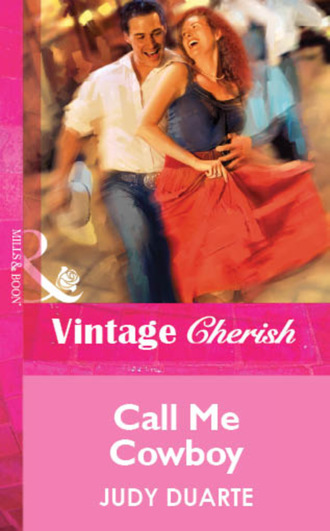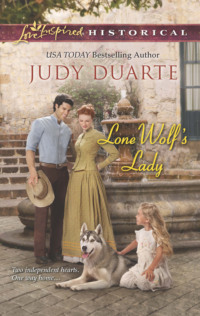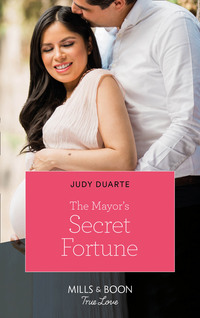
Полная версия
Call Me Cowboy
Some dreams could seem real when they weren’t, but he let her talk.
“It woke me at two in the morning. My heart was pounding and I had this uneasy feeling.”
“What did you dream about?” he asked.
“When I was only three or so, my daddy carried me to his pickup in the middle of the night, then drove straight through to the small town in Iowa where I grew up.”
“A lot of folks start a long trip before sunrise,” he said. “It’s easier to drive when the roads are clear of traffic.”
“Yes, but my father kept shushing me as we walked down the stairs and out the front door. He told me that everything would be all right.”
“Is that what you remember? Or was that part of the dream?”
“It was too real to ignore, so I went into my father’s bedroom and began sorting through his things, something I’d been putting off.”
Cowboy assumed she must have found something that validated her suspicion. A gut feeling wasn’t much to go on. And he wouldn’t take her money if he suspected the investigation would only be a crap-shoot. He needed more information than what she’d already given him.
“My dad had this old cedar chest that he’d made in a high school shop class. And he stored his things in it, like an Army uniform, a Boy Scout shirt with all his badges.” She looked at him with glistening blue eyes. “He was an Eagle Scout.”
Was she thinking that precluded her old man from lying or keeping something a secret?
“His Army dispatch papers were in there, too,” she added.
“And?”
“My father’s real name was apparently Clifford Richard Epperson, not Clinton Richards. And I need someone to help me uncover the reason why he changed his name.”
“Is that all?” he asked.
Yes. No. Priscilla wasn’t sure.
She cleared her throat. “Well, there is one other thing, although it might not amount to anything at all.”
As he waited for her come up with a response, Mr. Whittaker—or rather, Cowboy—leaned back in his chair. She found it impossible not to study him, not to be intrigued by him.
He was a big man. Tall. Well over six feet when he stood. His light brown hair appeared stylishly mussed, but she suspected that was due to the white cowboy hat resting on the other side of the huge mahogany desk at which he sat. His hazel eyes glistened like amber in the sunlight. And his voice was enough to lull a woman into mindless submission.
Sylvia had been right about his soft Southern drawl.
It’s so darn sexy it’ll make you melt in a puddle on the floor.
“What’s that?” he asked.
“Excuse me?” Her cheeks warmed as she realized he’d been waiting for her to answer while she’d been gawking and pondering things best left alone.
“You mentioned there was one other thing I ought to know.”
“Oh, yes. I was so wrapped up in…uh…the memory and trying to sort through it.” She cleared her throat again, hoping to dislodge the lame excuse for the sexual direction in which her thoughts had drifted.
“Then take your time.” He rocked in his seat, the leather chair creaking from his weight. But she focused on the task at hand, on the information she ought to share.
“My father died of cancer. And the end was pretty rough, even with hospice to help us.” She tried hard to remember exactly what had been said. “Right before he slipped into a coma, I sat by his bedside and told him how much I loved him, how happy I was that he’d been both mother and father to me. That I was the luckiest daughter in the world. And that if God was calling him home, I was ready to let him go so he could join my mother.”
Cowboy didn’t comment, so she continued.
“My dad gripped my hand, then tried to speak. He said something about my mother, but the words were garbled. I did pick up an ‘I’m sorry.’ And a bit later, ‘God forgive me.’ I assumed he meant he was sorry for dying and leaving me alone. That he was trying to make peace with God so that he could go to heaven.”
“And now you’re not so sure?”
No. A memory seemed to be just under the surface, waiting to be revealed.
“I’m not sure what to think. But I want to know why he changed his name. That would be a good start.” She reached into her purse and pulled out a yellowed envelope. It held her father’s discharge papers, along with her birth certificate, which listed Clinton and Jezzie Richards as her parents. “You see? His names don’t match.”
“When did your father die?”
“The Fourth of July. Independence Day.” She smiled wryly. “It’s kind of ironic, I suppose. He’d never wanted me to be alone.”
Cowboy glanced down at the paperwork. “It shouldn’t be too difficult to trace his steps.”
“Good. It’s time for me to go back to work, to put my life back on track. But I can’t face the future without knowing what happened in the past.” And until she got some answers it would be impossible for her to focus on the stories she edited, the tales meant to provide children with warm fuzzies. Not when her own childhood was so unsettling.
And confusing.
While in college, she’d categorized her memories into levels, like the stories she now edited.
The time she and her father had lived in Iowa had been the chapter-book years, and the memories were abundant and happy.
But she had very little recollection of the picture-book years, just the flash of an image, the sound of a soft but undistinguishable voice.
A big white house with a step that squeaked—the one at the bottom of the landing. A Snoopy night-light with a broken ear. A tire swing under an old oak tree.
A faceless dark-haired woman who made sugar cookies with little colored sprinkles on top.
“Where can I reach you?” Cowboy asked.
She slipped her hand into her purse for a business card, then pulled out a pen and jotted down her home and cell phone numbers. Then she handed it to him.
He glanced at the card that displayed a colorful child’s sketch of a sun in the top left-hand corner and a small tree at the bottom right.
“Sunshine Valley Books,” he read out loud. “Priscilla Richards, Associate Editor.”
“We publish children’s literature,” she said.
He chuckled, his hazel eyes glimmering with mirth. “I was close.”
“Close?” she asked. “I don’t understand.”
“I had you pegged as the librarian type.”
She smiled. Sylvia had probably pegged him right, too. Cowboy Whittaker was a charmer. And she suspected he was a footloose bachelor who’d never met a woman he didn’t want to wine or dine.
Or bed.
Not that Priscilla was interested in being another in a long line of conquests.
But that didn’t mean she didn’t appreciate his style. Or his looks.
“You know,” she said as she stood and slipped the strap of her purse over her shoulder, “I really like the sound of your voice. Your accent is…” She paused, unable to finish her line of thought. She couldn’t very well tell him that she found it sexy. So she reached for something more appropriate. “Your voice is gentle on the ears.”
“Well, now. Ain’t that something. I’m pretty partial to the sound of your voice, too.” He tossed her a boyish grin. “It’s as sexy as all get out.”
She swallowed, unsure of what to say.
Was he flirting with her?
Or teasing?
Either way, she dropped the thought like the wrong end of a hot curling iron.
He followed her to the door, then reached for the knob. “I assume Margie has already gone over our rates.”
Priscilla nodded. “Yes, she has. And I gave her a deposit.”
“It shouldn’t take more than a couple of days to get some kind of answer for you. And we can take it from there.”
She nodded. “Thanks. I appreciate this.”
He opened the door in a courteous manner that made her think that chivalry was alive and well in Manhattan.
As she stepped out of his office, she glanced over her shoulder, taking in the stunning view one more time.
But not through the office window that looked out at the Empire State Building.
It was the fair-haired “cowboy” who’d caught her eye and made her heart skip a beat.
He slid her a smile. “I’ll call you.”
She knew he was talking about the case. But somewhere deep in her heart she wondered what it would be like to wait for another kind of call from him.
A personal call.
But that was silly. The man probably had a legion of women clamoring for his attention. And Priscilla wasn’t planning to ride off into the sunset with anyone.
Not until she’d come to grips with her past and uncovered her father’s secret.
Chapter Two
As the sun hovered over Manhattan, Cowboy turned his desk chair a hundred and eighty degrees, providing him with a view of the city.
His day was growing crappier by the minute.
First his mother had called, insisting he come home in a couple of weeks for a fancy dinner party she was having, a formal wingding to kick off his brother-in-law’s campaign for congressman.
It was a command performance for all the Whittakers, he supposed. But it was an event the family black sheep wasn’t eager to attend.
The youngest son of an oil-rich family, Trenton James Whittaker had been born a maverick. And his prim and proper mother had been hell-bent on taming him since day one. But Cowboy—or rather, TJ to folks in Dallas—had never been the submissive sort.
His mother had finally given up trying to control him. But that hadn’t stopped her from doing her damnedest to set him up with every “suitable” debutante or socialite she could find, hoping the right woman would make him toe the mark.
TJ hadn’t been interested in any of them and he’d responded to her meddling by bringing home “dates” he knew she’d never approve of.
Not that he’d set up an unsuspecting woman for an inquisition or a snub. His “dates” had all been friends or acquaintances who’d known what they were getting into. And they’d dressed for the occasion.
It was part of the game.
Elena Cruz, the last gal he’d taken home, had walked into the Whittaker estate sporting stilettos, a black miniskirt and a bare midriff revealing a belly-button ring and a stick-on tattoo.
Later, over a beer, he and Elena had laughed about his mother’s reaction.
But there was a hell of a lot more going on between him and his mom than rebellion.
For the past fifteen years they’d been involved in a cold war, an undeclared conflict that had started when she’d walked into the living room unexpectedly and found him and Jenny Dugan sharing a tongue-swapping kiss. She’d embarrassed the poor girl so badly that, as far as TJ was concerned, she’d triggered a set of circumstances that had led to Jenny’s death. And he’d never really forgiven his mom for that.
Not that she’d asked him to.
Maybe that’s why he’d continued to be a burr under her saddle, a thorn in her side.
He hadn’t been as contrary or ornery lately, though. But that’s because he’d grown tired of the family rigmarole and gone to New York on a whim, a visit that had become permanent after he’d met Rico and landed a job with Garcia and Associates.
Absence might not have made his heart grow fonder, but his life had become a hell of a lot more peaceful.
He glanced at the calendar. July twenty-third was wide open, so he’d fly to Dallas that weekend and attend the dinner party—for his sister’s sake.
While on the telephone, he’d told his mother as much.
Still, it had been more than his mother’s call that had sent his day on a downhill slide.
He’d just uncovered information that would set his latest client’s world on end. And he wasn’t looking forward to telling her.
His first impulse had been to call Priscilla Richards so that he wouldn’t have to deal with her tears and emotion in person. But that would be the coward’s way out. A face-to-face meeting was definitely in order—even if he wasn’t up for it.
“Hey,” a familiar voice sounded from the open doorway to the lobby.
Cowboy turned and shot Rico an ain’t-you-a-sight-for-sore-eyes grin.
He didn’t have to ask how the honeymoon trip to Tahiti had been. Rico wore a sugar-pie-honey-bunch smile that claimed he was bonkers in love and content to be hog-tied to one woman for the rest of his life.
Cowboy chuckled. “It’s about time you got back here, lover boy.”
“I thought I’d better make sure my right-hand man hadn’t run the company into the ground while I was away.” Rico made his way across the office toward Cowboy’s desk. “How’s it going?”
“So far so good.”
Rico studied him for a moment. “You’re not one to ponder the city view, no matter now nice it is. What’s the matter?”
“Just another invitation from home due to social protocol and an effort to keep up pretenses.” Cowboy shrugged. “But I’ve also got to break some bad news to a client and I’m not looking forward to it.”
“Anyone I know?”
“No, she’s brand-new. A referral from Byron Van Zandt.”
“She?” Rico asked. “That should make it easy. You’re an ace at handling ladies and turning on the charm.”
Cowboy chuffed. “Not this time.”
“Why not?”
“She’s not the kind of woman I charm. That’s all.”
Priscilla might not have the wealth and social standing of some of Dallas’s haute single crowd, but she was one of them just the same. The kind of woman who cared about her reputation and had serious expectations of the men she dated, men she could control and force to go to all those high-society functions. And he’d be damned if he’d let one of them try to hogtie him and drag him off to honeymoon heaven.
Rico plopped down in the chair in front of Cowboy’s desk. “Sounds like she’s either an old biddy or a gal just like the one that married dear ole Dad. Which is it?”
Cowboy cracked a wry smile. “She’s not old. And if she’d shed that prim and proper shell, she’d be a real looker. But my gut tells me she’s too damn nice for the likes of me. And I’m not into nice girls, remember?”
“Yeah, I do. If she had a wild streak, you’d be in a real pickle, especially since you don’t date clients, either.”
“You’re right about that.” Cowboy wasn’t sure how this particular client had tapped into the well of sympathy that rested under his surface. But nevertheless, when he’d learned what she was up against, he’d been worried about how she’d take the news.
“So what’s bothering you about the case?” Rico asked.
“I don’t know. I just have this feeling she’s going to buckle and fall apart and I don’t want to feel as though I should help pick up the pieces. I’m not good at that sort of thing.”
Rico reached into the candy dish Cowboy kept on the desk and scooped out a handful of M&M’s with peanuts. “What makes you think she’ll get emotional?”
“She just lost her father, a man she loved. And I have to be the one to tell her he was a bastard in disguise.”
Cowboy knew his report would open a can of emotional worms for Priscilla. And he wasn’t up for the backlash—unless she surprised him and just got good and angry. He’d much rather be faced with kicking and screaming than tears.
Rico leaned back in his chair, leather and springs creaking under his weight. “What’d you find out about her old man?”
“There were a couple of outstanding warrants out for his arrest in Texas.”
“What were the charges?”
“One was for assault. And the other was for kidnapping.”
Priscilla sat on the floor in the middle of her father’s bedroom, placing his old clothing into a box for the Salvation Army.
The room still bore his scent—a combination of Old Spice and pipe tobacco—yet a faint medicinal smell remained, reminding her of the pain he’d suffered during his final days.
It hurt to part with the things he’d once worn, but it was silly to keep his old shirts, pants and shoes when someone else could get some use out of them.
She’d already gone through the file cabinets, finding old tax returns, paid bills and the pink slip to the Ford Taurus he’d purchased nearly seven years ago. Among his things she’d discovered her birth certificate, which she’d given Cowboy. She’d also found her immunization record and old report cards.
But there was no marriage license.
Nothing from the picture-book years.
But that was to be expected. A fire caused by faulty wiring had claimed the life of her mother and burned the hundred-year-old house they’d once lived in to the ground. Everything the family had owned, including photographs and memorabilia, had been destroyed.
The only thing left was the old cedar trunk her father had made in a high-school shop class. He’d brought it to Iowa in the back of his pickup that cold, dark night when he and Priscilla had left Texas.
She placed her hand on the polished cedar. Her father had once labored over the wood, sanding it and adding lacquer to make it shine. Then he’d given it to her mother to use as a hope chest.
But instead of hopes for the future, the trunk held faded memories now.
She lifted the lid and pulled out his musty green Army uniform.
Years ago, when she’d been in middle school, she’d walked in on him while he’d knelt before the chest, going through the contents. She’d startled him, and he’d jerked back as though she’d caught him doing something wrong.
His eyes had been red, watery, and he’d quickly balled up the shirt, tossed it back inside and closed the lid. For a moment she’d thought he was going to snap at her. Instead he’d held his tongue, brushed his hands under his eyes to remove evidence of his sadness and cleared his throat.
“How about an ice cream cone?” he’d asked.
His response had been surreal and his question had taken her aback. At the time she’d wanted to quiz him about the past, to talk to him about his grief, to share her own disappointment at having to grow up without a mother. And she’d wanted to ask some of the questions she’d been storing for years.
But whenever she’d mentioned her mother, Texas or the past, a veil of sadness had washed over his face. She’d easily concluded that there was something tender inside him, something that had never healed. A vulnerability that embarrassed him.
So, as she’d done so many times in the past, she’d tried to make it easy on him and his battered heart by leaving the past alone.
Instead she’d agreed to go for an ice cream cone, trading a double dip of rocky road for the conversation and shared tears she would have preferred.
Now, weeks after her father’s death, she still knew very little about the man he’d really been.
As she studied the front of his Army shirt, she saw the scraggly loose threads where a name tag used to be.
Had he tried to hide his identity from her?
And if so, why hadn’t he just ditched the uniform? Storing it made no sense.
She placed it aside and removed the Boy Scout shirt that boasted a green sash filled with badges. Archery. Swimming. Camping. Canoeing. First Aid.
It seemed as though he was holding on to the memory of his achievements. But if so, why had he kept them hidden in a trunk, hidden from her?
She removed the other items—a well-used baseball mitt, a football autographed by teammates, a Swiss Army knife, a book on hunting and camping. Apparently her father had been athletic in his youth, interested in sports and the outdoors.
Yet the man she’d known had been quiet-spoken, a bookworm. A homebody. And his only activity had been a daily walk to get the newspaper.
She’d assumed it was because of his bad leg, an old Army injury. But come to think of it, he’d never watched sports on TV or given her any indication he’d ever had an interest in anything other than her, his books and his computer.
It didn’t jibe.
Who was her father?
And more importantly, who was his daughter?
Until she had the answers, Priscilla wouldn’t rest.
After emptying the chest, she peered at a piece of pink floral wallpaper that covered the bottom. One corner was curled up.
As she reached to straighten the paper lining, her fingers brushed against something underneath.
The edge of a card?
She tugged at the corner, removed the lining and spotted an old Polaroid photograph of her father wearing his Army uniform—with EPPERSON clearly printed on the name tag. He stood beside a short, dark-haired teenage girl with a pretty smile.
Was that her mother?
Priscilla couldn’t recall any specific details of her mother’s face, but she remembered her as a big woman, heavyset. In fact, Priscilla hadn’t been able to wrap her little arms around her waist for a hug.
But the girl in the picture was slight, petite.
Priscilla studied the couple again, wishing her father were still here to talk to.
She flipped over the snapshot.
No names. No notation.
Before she could peruse the picture any longer, the doorbell rang.
It was probably Mrs. Hendrix with another casserole. The elderly widow dealt with loneliness by reaching out to people in need. And she’d been a real blessing to Priscilla these past few months, first as her father’s health had deteriorated, then during the funeral arrangements and now with thoughtful gestures and visits.
Priscilla stood, brushed her hands on the fabric of her black slacks, then padded to the living room in her bare feet.
A strand of hair had escaped the ponytail she wore, and she tucked it behind her ear. When she reached the door, she tiptoed and peered through the peephole, preparing to greet her neighbor.
But it wasn’t Mavis Hendrix on the stoop; it was Mr. Whittaker—or rather, the man they called Cowboy.
Her heart thumped, then raced as she swung open the door.
He removed his hat and shot her a heart-spinning grin that warmed her cheeks.
She tried to hide her surprise and returned his smile. “Hi.”
“I was in the neighborhood and thought I’d stop by to talk to you.”
“I…uh…” She nodded toward the bedrooms. “I was just going through my father’s things.”
“Is this a bad time?”
To talk about the investigation she’d hired him to do? On the contrary, it was probably a good time. She was knee-deep in the past—or at least what little she knew about it. “No, please come in.”
As the big man stepped into the living room, the walls seemed to close in on them. His cologne, something light and musky, settled around her, and she found herself savoring each whiff of his scent.
He wore faded jeans, a chambray shirt and a brown leather jacket. As he removed his hat, looking as though he’d just walked out onto a Dodge City street, she couldn’t help fussing with the side of her hair and wondering if any other strands had come loose.
Her attention returned to her guest, and she watched as he scanned the room. His gaze first lit on the boxes she’d filled for the Salvation Army and then on the curtains she’d forgotten to open this morning.
“I probably should have called first,” he said.
“That’s all right. I’ve been sticking close to home these past few months.” She pulled the rubber band from her hair and combed her fingers through the curly strands, hoping she hadn’t made her appearance look worse. She didn’t like having people see her unkempt, especially this particular someone.
When he caught her gaze, her fingers stilled and she dropped her hands to her sides. “Have you learned anything about my father?”
“Yep,” he said, nodding but not smiling. “There’s more investigating that needs to be done, but it’s your call whether you want me to do it or whether you’d like to take the ball from here.”
“I guess that depends on what you’ve learned.”
He made his way toward her, then placed a hand on her shoulder, sending a flutter of heat through her bloodstream. “Let’s take a walk.”
A walk? “You don’t want to talk here?”
He scanned the room again, then slowly shook his head. “Nope. I’m a fresh-air-and-sunshine sort of guy.”









